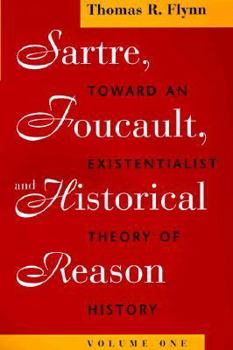Sartre, Foucault, and Historical Reason, Volume One: Toward an Existentialist Theory of History Volume 1
Select Format
Select Condition 
Book Overview
Sartre and Foucault were two of the most prominent and at times mutually antagonistic philosophical figures of the twentieth century. And nowhere are the antithetical natures of their existentialist and poststructuralist philosophies more apparent than in their disparate approaches to historical understanding. A history, thought Foucault, should be a kind of map, a comparative charting of structural transformations and displacements. But for...
Format:Paperback
Language:English
ISBN:0226254682
ISBN13:9780226254685
Release Date:September 1997
Publisher:University of Chicago Press
Length:356 Pages
Weight:1.10 lbs.
Dimensions:0.9" x 6.1" x 9.1"
Related Subjects
Existentialism History History & Surveys Humanities Philosophy Politics & Social SciencesCustomer Reviews
1 rating
The Truth about Foucault and Sartrean Marxism
Published by Thriftbooks.com User , 23 years ago
Flynn, a professor at Emory does a really nice job at elucidating a common problem. Foucault is casually lumped together in the structuralist/post-structuralis school because of his association with Althusser and Lacan. While that particular methodology is obviously an influence on Foucault, he distinguishes himself from them in various interviews which can be found in the plethora of collections that contain interviews and articles with or written by Foucault. Foucault (as I maintain and Flynn seems to imply) is more of a "constructivist" (a word I've heard him use to describe himself). In his genealogoy and approach to history he CONSTRUCTS clearer model of of the discourse surrounding our typical views of the social construct. He does more than elucidate the structure, he constructs some sort of history about it...HOWEVER, not to give any kind of conclusion, but rather as a disruptive act to spawn analysis and discourse.In this way, he is like Nietszche (which he himself claims). He much prefers to be a disruptive force, or a catalyst for change and discourse than a scientific systematic philosopher. In many ways, this is his relationship to the Western Marxists (and Sartre, whose existentialism does owe a great deal to Nietzsche, which Foucault seemed to be proud of in some ways...i'm referring to both thinker's appreciation for Nietzsche). Sartre maintains subjectivity, and the ability of the subject to choose its own history, much as Engels asserts in Marxism, however, he admits like Marx claims, that there are a series of pre-determined factors that influence those choices (within the subjects environment). Flynn explores the TRUE subjectivity of existentialism...not as a will to power (though to an extent, this certainly is the case), but as the starting point for the intersubjectivity that molds our history, and its relationship to the Marxist project that elucidates the ills of captialism, the force behind the mode of production (which is the will of the people), and how we construct our history and discourse, and what that means about ourselves as individuals and our place in the world. Ultimately, reading Flynn's incredible and original book will offer a more thorough, documented and scholarly interpretation. He even pulls on some more obscure later Sartre (like the oft forgotten biography of Flaubert, "The Family Idiot"). His research is astounding, his understading of this very difficult material astounding. He makes a cohesive synthesis between existentialism and post-modernism, better than the post-modernists themselves.






